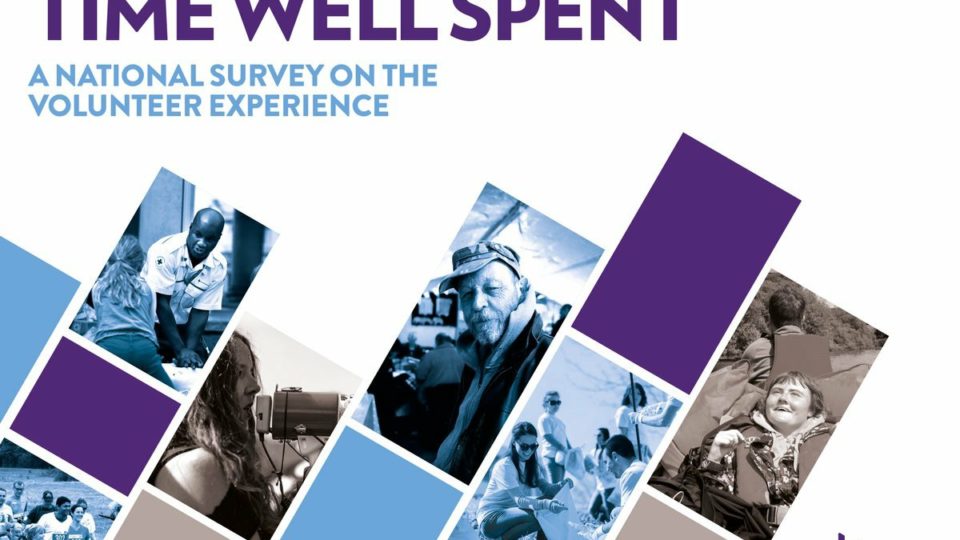AVM Chair Ruth Leonard’s response to NCVO’s ‘Time Well Spent’
There seems to be plenty of research telling us who does what in terms of giving time; but less about the why – and indeed the why not, so NCVO’s latest report ‘Time Well Spent: A National Survey on the Volunteering Experience’ really fills a gap. Beginning to explore the role that volunteer management plays in the overall experience is an exciting start as well!
Empowerment not management
Empowering people to make a difference in their local communities and bring about change using their skills and assets is why I am excited and passionate about volunteer management. Volunteering today is really becoming embedded in thinking about how services are delivered; including within the statutory sector. It is interesting to see within this research some differentiation between which sectors volunteers give their time to – and therefore where we can learn from each other. AVM is an organisation which supports anyone who involves volunteers, from all sectors and disciplines in order to learn, share and connect.
I believe that involving volunteers is so much more than about saving money, and that even if an organisation had all the money necessary to deliver their services they should still want to involve volunteers – because of real benefit they bring. These include:
- Engaging with local community: extending an organisation’s reach and relevance
- Making a difference to service users: research shows us that people are more likely to believe what they are told by a peer or volunteer than by an employee or professional
- Being objective decision makers: which adds credibility to an organisation’s stance.
Specialism and focus

One of the other aspects for me is volunteers’ ability to specialise and focus; but at the same time being able to innovate and experiment. I was interested to see that volunteers themselves don’t necessarily feel that they have the opportunity to be able to do this, with over one in six reporting that they have skills and experience which they’d like to use in volunteering that they’re not currently using.
Whilst this is clearly not a large number it seems statistically worth considering from a volunteer management point of view, so that we can ensure that volunteers are able to give in a meaningful way which also meets their personal needs. People-powered services should be exactly that – powered by people not by systems or processes.
What exactly is volunteering?
There is a great piece of research which I would encourage anyone interested in this area to read called ‘A rose by any other name …’ Revisiting the question: ‘what exactly is volunteering?’ and in that the authors identify that there are three perspectives on volunteering:
- Unpaid work or service – helping people who are ‘less fortunate’
- Activism – mutual aid such as self help groups and campaigning
- Serious leisure – such as in the arts and culture and sports fields.
I suspect that we are culturally used to viewing people giving their time through the first lens; what we might think of ‘traditional volunteering’, generally limited to predetermined functions and selected for specific tasks; but to do so would mean that we are moving away from people’s motivations and interests and merely valuing the transactional and that which is carried out through an organisation – which I think could be a barrier to those people who come forward because they want to just do something
There is a wide spectrum of reasons for giving time, energy and experience and people do so in many ways – including to a variety of sectors as well as to none. Boundaries are being increasingly blurred between the sectors – state, charities and private – and those who want to do something to make a difference want to do just that; so it is our responsibility to help facilitate that as much as possible.
Bringing groups and organisations together in a whole system response will provide a better, more impactful outcome and also tap into the motivations and assets of the wider community in a way which can make change more sustainable.
Enjoyment should not be underrated

And this is important; one of the things we know about people who choose to give their time is that they want to be involved in something where they can have real impact and make a difference; and this report shows that is important for 90% of those who volunteer – although “I enjoy it” comes out top reason with 93%. Volunteering demographics and expectations are changing – with the older volunteers now coming from the Baby Boomer generation more used to being self-directive and in charge then their traditional, dutiful stalwart parents. In fact this report refers to research about over-committed volunteers feeling overburdened and burnt out.
Younger people are being encouraged to play a more active part in society. Both groups are keen to shape their experiences and are adept at building new services which transform lives because they are rooted in how people really think. To quote the report, we need to be providing opportunities that resonate with people’s own lives and motivations and ensure they can shape the way they get involved. This, I believe is central to ensuring people can make the difference they want to – and which can make the difference to the organisation with which they’re involved.
Volunteer management and volunteer satisfaction

I am, unsurprisingly, particularly interested in the thoughts about how volunteer management affected people’s experience in giving time. It is testament to volunteer management in its broadest sense that satisfaction with volunteering is high, with this research showing that 96% of those currently giving time are fairly or very satisfied but I don’t think we can be too self-congratulatory.
We know that heuristics such as confirmation bias can affect how people respond; and the fact that the research shows that those who have spent longer away from volunteering may be less inclined to return to it does possibly demonstrate this, with the more recently involved they have been the more likely they are to be open to encouragement; so I think it is important that we all consider how we – as a movement – stay in touch with people and keep them engaged and potential opportunities engaging.
And even with this high degree of satisfaction the research shows that over a third (35%) of the volunteer respondents think their volunteering could be better organised and around a quarter (24%) that there is too much bureaucracy. This gives leaders of volunteering something to consider – especially as, the research points out, this is something which came up in the ‘Helping Out’ survey 12 years ago. How do we ensure the necessary and relevant structure without impeding the volunteer journey and experience?
Volunteer management: it’s not HR
One way is to be clearer about where volunteer management is different from HR. Particularly as another concern from nearly a fifth (19%) of the respondents is that volunteering is becoming too much like ‘paid work’, volunteer management needs to be less about telling and more enabling and encouraging flexibility.
Volunteer managers – which means everyone who works with volunteers not just those staff members with that term in their job title – need to be developing skills at mobilising social action; and this is something which should be built into the supporting infrastructure. We owe it to our volunteers – giving their time, energy and experience – to make this gift as effective as possible. We need to recognise and enable the deep connection people feel with volunteering and the complexity of its impact on their lives through developing and supporting them – and their managers – by means of community engagement and empowerment.
The real question leaders of volunteers need to ask is whether we have created a space for enabling genuine inclusion and involvement in our programmes. In order to achieve this, new processes should to be embedded in existing systems.
A key element of this infrastructure, I would argue, is having well-trained and well-supported people to provide the day to day volunteer management, whether paid or unpaid. We are all familiar with the well-deserved accolade of volunteers to our organisations – and indeed the sector as a whole. But in order to enable volunteers to offer the greatest value and in order to ensure that there is equity offered to everyone who wants to give time to us, we need to recognise that Volunteer Managers matter as well.
Keeping a balance between an efficient, supportive volunteer programme with a responsive and adaptable relationship carries all the way though a volunteer journey. Volunteers need to be supported once they’re involved, in a way that is meaningful to them and meets their changing needs. Organisations which involve volunteers have to reflect on the importance of putting resources into their volunteering programmes, including equipping those who work with our volunteers.
Leaders of volunteers are part of the solution
We may not be part of the problem but this does not make us actively part of the solution and I believe that our role as volunteer managers is to ensure we are just that, working together with volunteers to meet the needs of the organisation through their own skills.
This includes ensuring that leaders of volunteers feel confident and competent at managing some of the conversations with senior stakeholder around risk and developing the ability to cede some of their authority to enable people with something to offer to be able to do so in a meaningful way. Part of this should be looking at how volunteers can fully be involved and feel that they are able to influence the organisation; something which, this research shows, happens less for those who are managed by a paid coordinator.
Empowering everyone who works with volunteers – people giving their time – to feel confident in their abilities and knowledgeable about how to work with an individual’s and community’s existing assets is essential – and this is why this research is so important For me, volunteer management is the platform that enables people giving their time to be engaged, supported and motivated – and ensuring that volunteer management is recognised as a skill and a valued profession is essential to the continued flourishing of volunteers and indeed volunteering.




